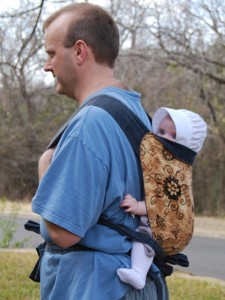After having my own children — now 7 and 2 years old — and watching them interact with other children in different situations, I’m convinced that compassion is learned by modeling the behavior.
Attachment Parenting (AP) is an excellent way to teach your children about compassion and what it means to consider other people around you and how your actions affect others around you.
When a parent is concerned about the child’s feelings and expresses it to the child, the child will learn that is the right way to communicate and consider other people and their feelings. When children learn first hand that their feelings matter because their parents care, they are more likely to model that behavior outside of home such as at school or playgrounds.
The other side of a compassionate, loving home is the authoritarian home, where the parents are in charge and the child’s feelings or opinions are not considered. This is a form of bullying actually when an adult, who is bigger and older, uses his or her power on a child who can’t defend himself and has to obey to avoid serious consequences.
The child who constantly gets bullied by his parents or siblings is more likely to be bullied or become a bully himself outside of home and show little or no compassion for others around him.
I’ve actually seen this type of behavior in action when a child who comes from an authoritarian home hurts another child and has little or no remorse and will only say “sorry” to the hurt child because his parents are demanding him to say it.
Deep inside, the child is just repeating the behavior and words he has learned at home and doesn’t really care if someone gets hurt, because why would he since nobody around him cares about his feelings?
It’s very sad, but this type of behavior is very common in today’s households. Bullying at school is a very common occurrence these days, and I’m certain that most of these situations could be avoided if children were treated with more respect and shown compassion at home by siblings and parents.
Children who learn compassionate behavior by nature at an Attachment Parenting home also have less sibling rivalry, because they care for their brothers and sisters who care for them in the same compassionate and loving matter. My heart goes out to those children who don’t get the model at home and get to experience what is like to live in a family where all members love and respect each other and are compassionate.
I hope that the AP children around the world can be role models at school and teach other children compassion and what it is like to be a caring individual, and hopefully that will have a lasting impact on some children who might have never experienced it.
Reija – Attachment Mothering

 This is a question that I have struggled with a lot in the four-and-a-half years, since I had my first son, Ryan, and discovered there was a parenting approach that lined up with my parenting views. I questioned that if I didn’t practice all elements of Attachment Parenting (AP), could I really call myself an “attached parent?”
This is a question that I have struggled with a lot in the four-and-a-half years, since I had my first son, Ryan, and discovered there was a parenting approach that lined up with my parenting views. I questioned that if I didn’t practice all elements of Attachment Parenting (AP), could I really call myself an “attached parent?”